Website Analysis: Tools to Identify Risks and Opportunities
It’s too common of a scenario where business owners don’t asses how their website is either contributing to or hindering their operations. What’s even more common is that a simple website analysis could fix potential issues and expand additional digital marketing opportunities. Unfortunately, without a quality website, your business is missing many opportunities to make a positive impression on potential buyers.
If your website is underperforming, or visitors can’t identify—or even find—your primary services, it might be time for a website analysis.
Why conduct a website analysis?
You wouldn’t purchase a car and expect there to be no maintenance. A website is no different. Technologies are updated, design trends change, and marketing channels improve. The site you built three years ago could be sorely outdated.
The hard truth is that, for the majority of industries, a customer starts their buyer’s journey online. The first step they take when deciding what to purchase begins with digital research. If your company doesn’t present itself with the same sense of quality and passion you do in the rest of your work, then there’s a good chance you’re missing out on sales.
Where should I start?
A website analysis identifies areas of improvement, pieces that are at risk of failing, and ideas for future opportunities. There are many indicators that a website is healthy. There are technical aspects that are harder to adjust and sometimes easy fixes that don’t even require a developer. Some of these elements include:
- User-friendly design
- Content strategy
- Search engine optimization
- Mobile friendliness & responsive design
- Load speed
- Site architecture
That’s a lot to maintain, let alone make improvements on. There are many tools to help keep track of all these moving parts.
Website Analysis Tools
SEMRush - SEO Analyzer
SEMRush has a number of functions, the majority of which will require a paid subscription. However, one of its most powerful features is an SEO analyzer. Within the domain analytics dashboard, you can review a domain’s entire keyword landscape and gain a better understanding of where the site currently ranks for in organic search results.
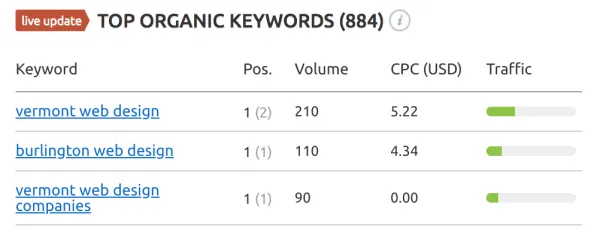 As you look for future keyword opportunities, SEMRush can assist in finding phrases that are relevant to your content goals, commonly searched for, and not overly competitive.
As you look for future keyword opportunities, SEMRush can assist in finding phrases that are relevant to your content goals, commonly searched for, and not overly competitive.
The issue with many content strategies is that little thought goes into how a keyword strategy should be overlayed. If nobody is searching on the target keyword, or well-known domains are already dominating the first page results, then your website won’t generate organic traffic. It’s important to use an SEO monitoring tool like SEMRush that can help identify all these factors when trying to decide on the perfect fit. Otherwise, you are creating content simply for the sake of creating content.
Ahrefs - Off-Page SEO Audit
There are an estimated 200+ direct and indirect SEO ranking factors to take into account. Though, they don’t all carry equal weight. Backlink building and off-page SEO has long been considered one of the most important ranking indicators and will continue to be into the future. It provides search engines with an accurate social gauge that indicates whether your website is effective at helping visitors find the information they’re looking for.
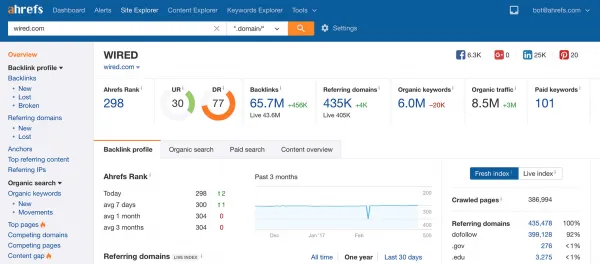
Ahrefs, another paid software, is a powerful backlink-checking tool. It’s widely considered to have the most accurate backlink library and largest backlink index of all off-page SEO audit tools. Ahrefs provides site owners with an in-depth link analysis that gives insight into referring domains, your most popular content, broken links, linking opportunities, and much more.
One of the more unique features of Ahrefs is the competitor comparison section. It gives insight into where similar websites are getting their backlinks. This is a great spot to find an audience that has already shown interest in sharing content that you can provide to their audiences. It’s the best area to find new backlinking possibilities.
HubSpot - Website Performance Grader
What’s the best part about the HubSpot website grader tool? It’s free! The website grading tool takes into account four basic building blocks of a healthy site: technical performance, screen responsiveness, on-page SEO, and security.
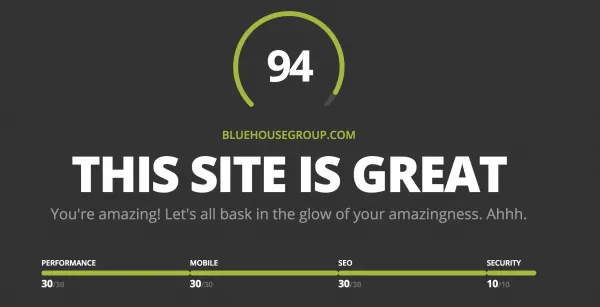
While it only takes a high-level glance at all these categories and doesn’t provide an in-depth analysis, it does give users links to high-value articles that go into better detail about who you can do to fix the issues that have been presented in the website analysis.

For example, if your website comes back with technical performance issues, HubSpot will identify the cause of the issue and provide insight into where you can gather additional information to fix the problem. Render blocking is a common scenario when JavaScript snippets haven’t been installed on a website properly. If this occurs when you run your site analysis, they link to a HubSpot knowledge article that lays out a six-step plan on how to alleviate render blocking problems that can appear in two popular CMS platforms.go into better detail about who you can do to fix the issues that have been presented in the website analysis.
Alexa - On-Page SEO Audit
Alexa will find missed SEO opportunities on your site pages. You might have found the perfect keywords to apply to your website, but the next question is how do you properly format a page to reflect that preference? If a page is missing certain elements that are important to search engine preferences then you could be missing out on search traffic. Elements like page titles, H-tags, and body content all have a certain amount of influence over what terminology that page will begin to rank on.
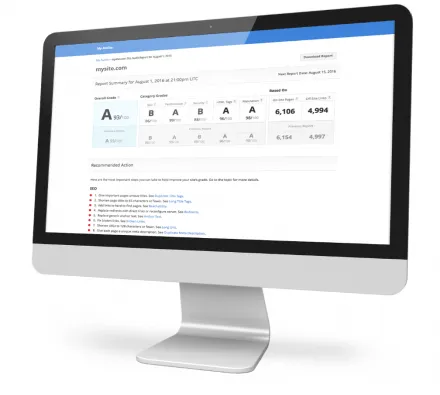 Having a thorough keyword strategy is awesome, however, you need to apply an equally thorough implementation process of those keywords when it comes to page placement. Alexa helps identify what’s missing and which pages it’s missing from. It finds the problems, gives you a clear way to take action, and then tracks your progress for future reporting.
Having a thorough keyword strategy is awesome, however, you need to apply an equally thorough implementation process of those keywords when it comes to page placement. Alexa helps identify what’s missing and which pages it’s missing from. It finds the problems, gives you a clear way to take action, and then tracks your progress for future reporting.
Website Speed Test
How quickly your website loads is now directly correlated to how well you’ll perform in search rankings. It also greatly affects how visitors interact with your site and whether they decide to stay or avoid a frustrating slow-loading situation. A website speed-testing tool like the free one Google offers is a great way to identify if your site loads fast enough.

The average user won’t wait for more than two seconds before deciding to leave the site their viewing, and the time drops even further if they are viewing it through their phone. After the Google Speed Test identifies problem areas it dissects them into categories that can be fixed and links to helpful articles that further explain the issue.
Mobile-Friendliness Test
Similar to the Site Speed Test, Google offers a free Mobile-Friendly Test. With over 50% of website traffic coming from tablets and phones its more important than ever to make sure web-surfers have a quality mobile screen experience on your site.
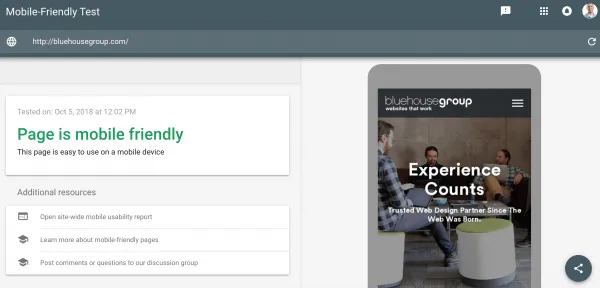
As a matter of fact, earlier this year Google implemented a search algorithm change that applies varying search results for mobile search queries. If your website isn’t mobile friendly there’s a good chance that it won’t be included in mobile search results.
Website Health - You’ve Found Issues, Now What?
Just because you’ve found issues while conducting a website analysis, doesn’t mean it’s the end of the world. There are many solutions that depend on what type of issues you’ve identified. Bluehouse Group can help you make a plan to pick changes, how to implement them, or let you know if you’ll be better off with a full website redesign.
If you don’t know where to start, try our free website assessment to get a gut sense of how your site is performing. If you aren’t happy with your website, contact us.